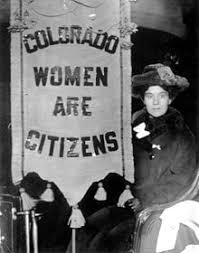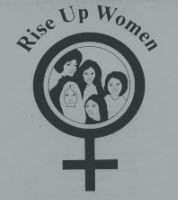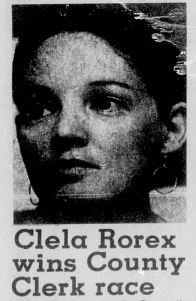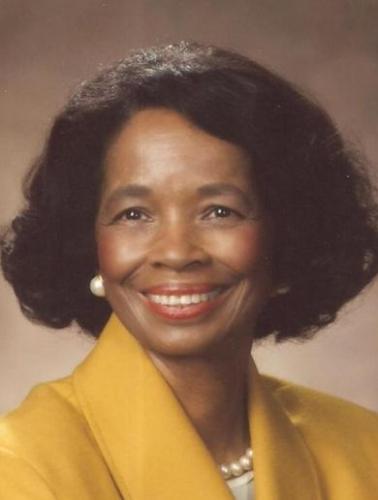
(Photo from Wikipedia.com)
As we continue to celebrate women’s history month here in Colorado and across the world, it is vitally important that we remember that no victory is ever won alone and that the greatest steps taken toward freedom and equality are those taken toward freedom and equality for all. While Colorado history has no shortage of fierce and courageous women who stood against oppression, today we celebrate the intersectional movements that transcended gender, race, and sexual orientation to unify Coloradans in the common belief that no one is free until everyone is free.
Caroline Churchill is perhaps one of Colorado’s most famous and fervent suffragists. She was incredibly outspoken proponent for women’s rights, a prolific writer and editor, and a vocal member of the temperance movement in Colorado. However, Churchill did not fight only for the rights that affected her directly. She was also an intersectional activist in her fight for fair treatment and equal rights for immigrant and native populations in the American West. Churchill believed that all people possessed certain God-given rights, regardless of race, origin, or gender and used her feminist newspaper, The Colorado Antelope (later the Queen Bee), as mouthpiece for her beliefs. In one issue of the Queen Bee, Churchill even printed a quotation from black Reverend L.G. Jordan in which he calls for women’s suffrage as a natural corollary to black suffrage. Churchill understood that oppression must be fought in all its forms and that there was strength in numbers for the oppressed. However, her outspoken support of native and immigrant populations was often viewed as too radical for many women’s suffrage groups at the time. Nevertheless, she was instrumental in securing the vote for Colorado women and continued her fight for equality up until her death in 1926.

While enfranchisement represents a significant step toward equality, Colorado women have long fought for more than just a right to vote. Denver is also the proud home of the Big Mama Rag (1972-1984), a feminist newspaper that advocated for more than just women’s rights and equality. It was also vocal, intersectional proponent of LGBTQ rights, and equality for immigrants and people of color at a time when same sex couples were persecuted and denied basic rights, and black and brown Coloradans still faced intense, institutionalized racism. The Big Mama Rag called for unity within and among oppressed populations against those who sought to keep them down. Stories in the publication even highlighted the doubly difficult situation of being a woman of color, immigrant woman, or lesbian in a society that was governed by straight, wealthy, white men.

One name in that has particular significance in the intersectional fight for women’s and LGBTQ rights is Clela Rorex. In 1975, when Rorex was still a young, Boulder County Clerk struggling for equality in the male-dominated world of politics, she solidified her place as fierce ally and advocate for LGBTQ rights when she issued the first same-sex marriage license in the nation. Rorex subsequently issued five more same-sex marriage licenses before she was ordered to stop by the Colorado District Attorney. Though she faced a great deal of backlash, threats, and hate, Rorex knew that true equality would require unity and solidarity.
In the arena of trailblazing Colorado women, it would be hard to find a more diligent and committed advocate for intersectional equality than Edna Mosley. Mosley didn’t just want equal rights for women and people of color, she wanted to have an active voice in the governance of her city so that she could advocate for true equality for all Coloradans. As part of her long list of political and social achievements, Mosley was the first African American elected to the Aurora City Council, She served as a civil rights specialist for Colorado’s Civil Rights Commission, and was director of the Equal Employment Opportunity Commission with the University of Denver.

(Photo from Legacy.com)
Furthermore, Mosley advocated for women’s equality and took active steps to see it through, including putting up $1000 of her own money in order to establish a women’s bank in Denver. Not only was she the only black woman on the bank’s organizing team, but she also served on its board of directors. Mosley knew that equal rights meant equal rights for all and dedicated her life to making her voice heard and ensuring that women and people of color would have a voice long after she was gone. Today, her legacy includes a school and scholarship fund, both bearing her name, ensuring that all people could have access to the same opportunities and voice in their communities.
Colorado women have never been ordinary. They were and still are fighters, survivors and trailblazers in a place that demanded struggle, but offered opportunity. However, those who were able to fight the hardest and go the farthest knew that they were only able to do so if they went together. Freedom and equality are not just women’s issues. They are the basic rights of all people. Our Colorado history has proven that intersectionality in any struggle doesn’t just add an element of inclusivity, it is an absolute necessity. This women’s history month, we celebrate the women who not only recognized this fact, but lived their lives as examples of its power.
- Topics in History: Intersectionality in Colorado: Women’s Rights are Human Rights - March 15, 2019
- Black History is Colorado History - February 22, 2019
- Celebrating Black Voices with the Book Club Resource - February 15, 2019